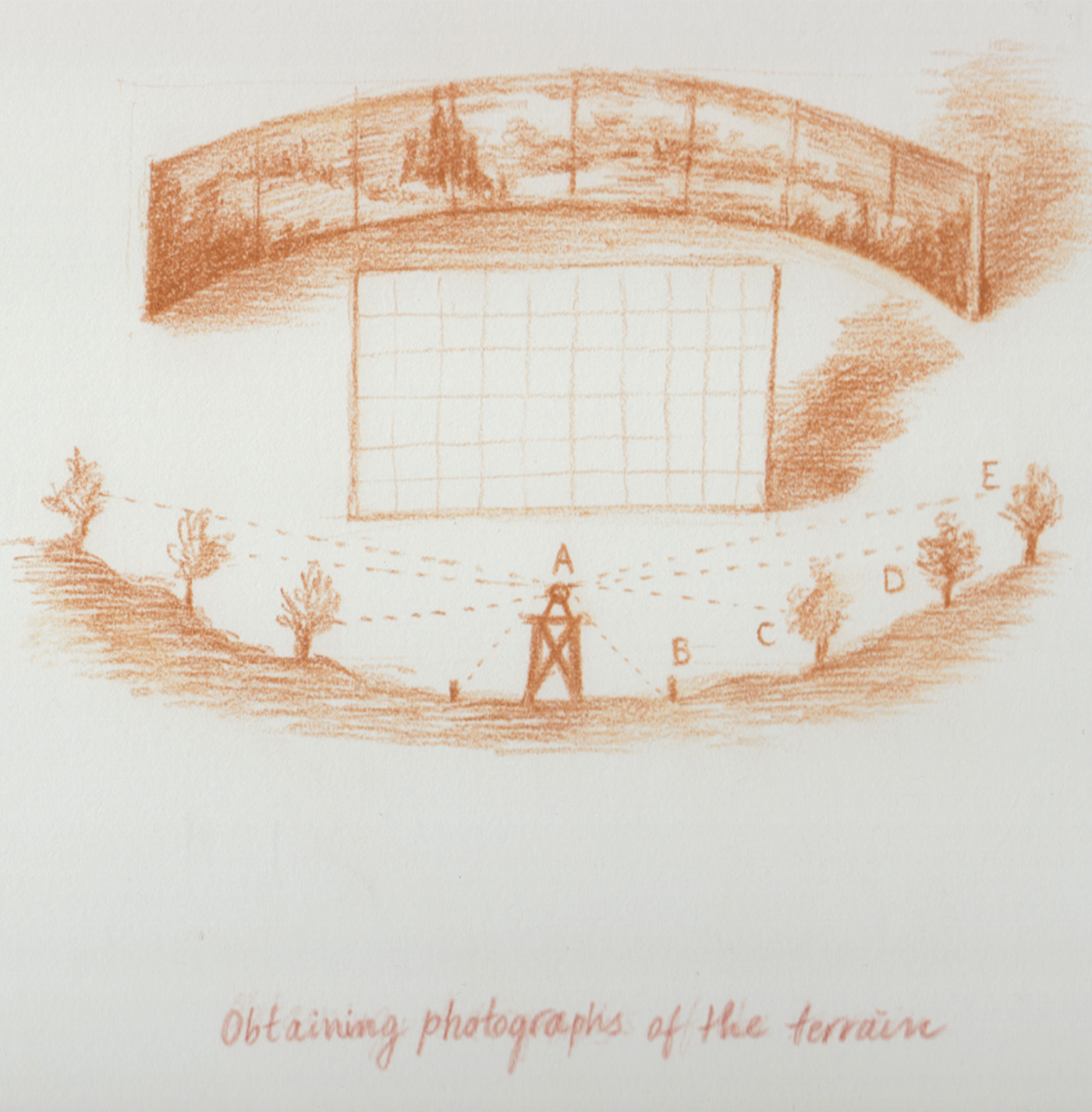A Little History of the Panorama
Matthew Cooperman / text
•
Simonetta Moro / drawing
thy portioned land
/
the eye can see
I: Claude Nicholas Ledoux, “The Creating Eye,” 1804
A thought of human scale, of the Cité Idéale, though it is late in
the night of the eye. Evolved toward salt, an architecture always
more detailed, more colossal. The eye radiates, apse and gate. One
day it is stalls for taxation, and the next, comfortable seats for the
polity. Whose neighbor, what neighbors, sometimes the whinny of
horses. From the sky it is a new carnival and the gates are
perpetually open
infinitesimal lash
colossal taxation
taking it / the apse
II: Obtaining Photographs of the Terrain
A grid laid upon reality, qua Wittgenstein, something abutting the
eye as much as the brain. As equal the brain the span. It is a grid
of trees and park legends, canals and tunnels for the epochal
subway. Relief must be extended. In the silvery dawn, a specific
nostalgia for the felt models of childhood enters from the left.
A.
B.
C.
E.
III: Panorama Painters at Work
Crosshatching too, at work. Representation in the grip of the
thumb. Are the men on their scrim scaffolding. They throw their
hands up before their eyes (perspective, height, rising azimuth).
Glorious in the X, which is a bond to time, they build a monument
to observe nature, and make a part therein. Strut by strut, the sky
goes up. One poor soul has broken his wheel. The sky will be too
elliptical.
relief
as equal the sky
the spin
history of looking into
upon
felt models of childhood
seeing one poor soul
to a common
walking here the beginning
and necessity
impossible object
to resist
social blazons unions to resist
sociology privileges
slowly the representations
epoch the same
advent of number democracy genetics
quantified heroes name
to a common
no one
IV: Hanging the Panorama in the Rotunda
It is an order of pipe cleaner trees, enclosure acts, free will and
wandering. It is the faux wildness just beyond by which
civilization thrives. Someone is making a surface, a dry wall. It
requires great skill in mortise and tenon, lost art of whittle and
bore. There is a reference to salt on the brow of the worker in
thrall to the wine press set in the village square. In others' words
and distances, the war far away, the body estranged, the classical
form from the rustic, the marble man from the child.
hammer the whistle
in wine
iron or
ire aye
the yesses implicit
in cinema
“the age demanded an image
of its accelerated grimace"
It is
an image
of work
and the end
of work
V: Cast Iron Frame of the Panorama Building, 1873
Thus carried away, if not beyond space and time, then from
everyday life to a moment thirteen years ago, a place 100
kilometers away. You, by the well, tumbling pinecones, a visitor
from the future casually changed from passerby to eyewitness. Are
you sighted? Am I able? Significant events, roving planets. She
finds himself surrounded by terns, ferrous earth. In the depths
below lie the forgotten hamlet. The compulsion for illusion
becomes all the more obvious in the next few sentences.
seeing as what is being said
is building what is being seen
Matthew Cooperman is the author of, most recently, NOS (disorder, not otherwise specified), w/Aby Kaupang, (Futurepoem, 2018), as well as Spool, winner of the New Measure Prize (Free Verse Editions, 2016), the text + image collaboration Imago for the Fallen World, w/Marius Lehene (Jaded Ibis, 2013), Still: of the Earth as the Ark which Does Not Move (Counterpath, 2011) and other books. His seventh book, Wonder About The, winner of the Halcyon Prize, has just been released by Middle Creek Publishing. A Poetry Editor for Colorado Review, and Professor of English at Colorado State University, Cooperman lives in Fort Collins with his wife, the poet Aby Kaupang, and their two children. http://matthewcooperman.org





